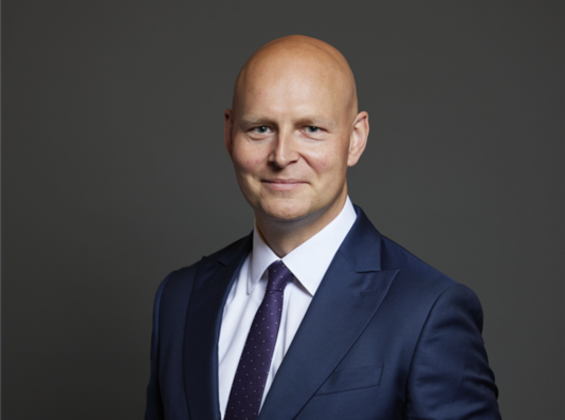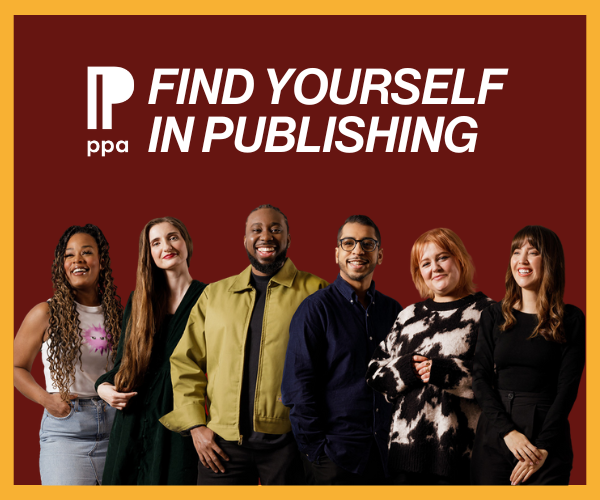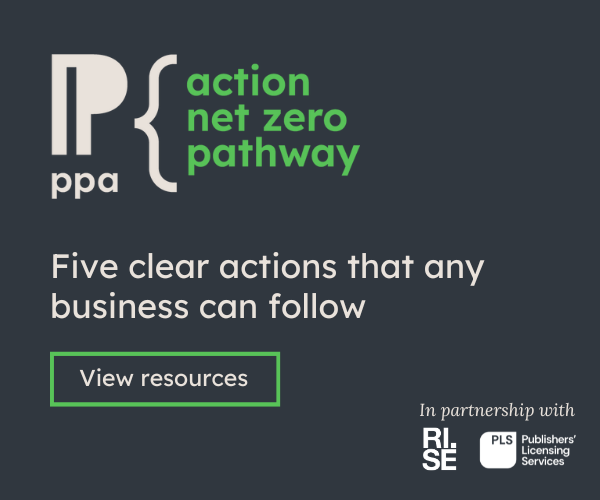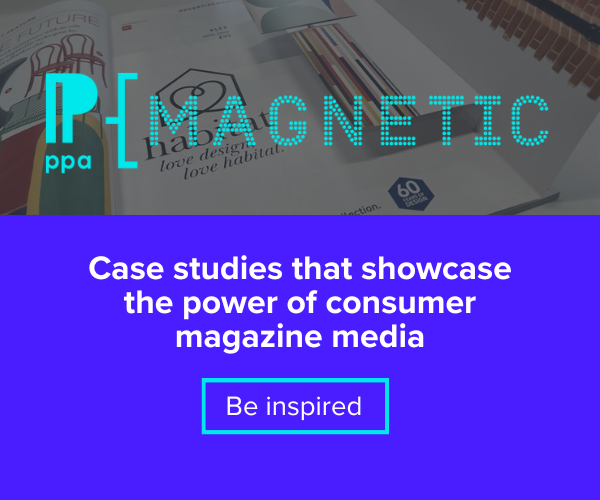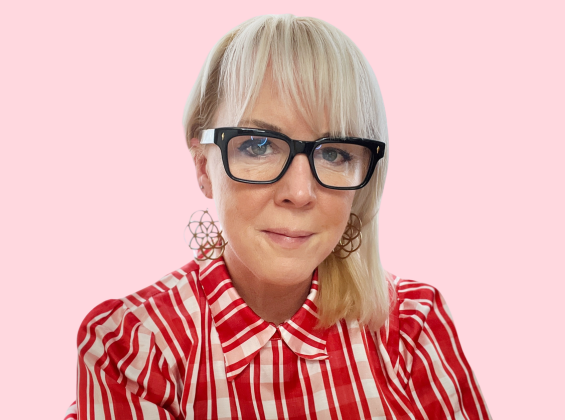
What made you want to work in the magazine industry?
So, I'm an accountant, and I wanted to do anything that made being an accountant less boring, and media seemed like a really good idea at the time. I joined, what at the time was, a small entrepreneurial, very fast growing, very exciting media company called Incisive Media, and as soon as I walked into that office, I thought that it had a buzz and an environment that I just fell in love with. I think that's really been something that's kept me excited for over 20 years.
Can you chart your journey from when you started out to your current position?
So, I started working for Incisive Media and we had about 25 staff, one main brand, a very small, very entrepreneurial team, and we grew that company very aggressively and organically with new launches, but also through a number of acquisitions. While I was there for over 15 years in the end, I had a number of different roles within that organisation and the organisation changed very dramatically over time.
At its peak we had 2,000 staff, with offices in Hong Kong and America. We'd been through being a fully public company. Then we did a management buyout and were backed by private equity. Then we went through a variety of other ownership phases, and during that time my career changed quite dramatically.
I qualified as an accountant and I became the Finance Director. For a couple of years, I worked on the mergers/acquisitions side of things as the Group Integration Director, sort of looking after businesses that we acquired along the way and helping them to integrate into the new Incisive Media fold.
I had another couple of years as the Group Finance Director, and then, frankly, I was bored. I didn't really feel like I had much of a challenge. The financial crisis had been going on a really long time, and life had just become about cutting costs and closing things down and looking at the numbers, and basically making people's lives uncomfortable.
I just wasn't really challenged, and I wasn't particularly engaged at that point in time, and then an opportunity came along to run the business's consumer division, because Incisive Media's primarily a B2B company. In fact it is a B2B company, but we had never intentionally launched, but we had acquired a number of consumer brands along the way as part of larger acquisitions, and we'd lumped them all together and called them the Consumer Division, and the guy who was running it decided to leave, and I saw that as an opportunity to try something completely different.
So I asked the board to take a leap of faith, which they agreed to, and that's when I became the publisher of the British Journal of Photography, amongst other titles and really very quickly after that I realised that this was my real passion, actually running that business, and I could see a lot of opportunity for that brand in particular, British Journal of Photography, and I realised the quality of the team as well.
I had this fantastic team working for me who were so passionate about the product and the industry. It was this sort of sexy side of what Incisive did in a sense, Incisive's a fantastic business, but the majority of the content is very much business to business.
I could see a big opportunity for that brand [BJP], outside of Incisive, as an independent company, because it had sort of bounced from one owner to another within the company, it didn't really have a natural home, because it wasn't called to the main business.
So, I approached the board and said I want to buy BJP. I'd already discussed it with the team and they were excited about the prospect of going independent. Long story short, we did that deal. That was five and a half years ago, and we formed at the time Apptitude Media, because the future was apps. Everybody was excited about apps, everybody thought that apps were the silver bullet that publishers had been waiting for.
We went quite quickly, prior to the acquisition and hearing people talk about apps and the future of digital publishing, and when we launched our own app, we saw a lot of success and we were one of the very early, really immersive, sort of interactive touch screens magazines to launch. We launched a very immersive version of British Journal of Photography on the iPad, and it took off in a way that we hadn't anticipated, and that was really one of the catalysts for the acquisition as well. We just thought: this is the future.
We won PPA awards, we won other awards. It just seemed very exciting, and to put that into context, BJP is a very niche monthly magazine, sales of a few thousand copies, yet the app was downloaded a quarter of a million times.
We quite quickly built up a subscriber base of thousands. We raised some finance and, sort of, set our stall to become the digital publisher of the future, called ourselves Apptitude Media, and the attempt was to build a portfolio of digital magazines, which we started to do, and also to create a studio where we were working with other publishers and other businesses who wanted interactive, touch screen content.
We launched two other magazines, we launched a quarterly iPad magazine called Fade To Black, which was all about independent film-making industry and obviously within that touch screen device you could show the films and show the trailers, so it was a really lovely product.
We launched the world's first smartphone magazine, built for the iPhone, all about smart phone photography. That was called Fltr, without any vowels, because we'd filtered them out. And they were both fine. They did okay. They got a bit of commercial support, and they built a loyal, but small following, but it just became quite apparent around about two years into the business that digital publishing wasn't actually the future, the panacea that we thought it was going to be, and these magazines without massive marketing budgets, which we didn't have, could never scale to something exciting, and we were running low on funds, and we didn't have the resources we needed to really take the business to another level.
We took a fairly brutal decision at that point, which was a couple of years in, to basically close down everything we'd started. It wasn't working, and we had to make about a quarter of the team redundant. It was a very hard time, and really had to start bootstrapping the business a bit. We were going back to basics and thinking we've got this fantastic 160-year-old brand, that we haven't really been focusing on, because we've been so busy looking at all these other shiny, new ideas, and getting all of our attention being diverted to new things, rather than actually being on this amazing asset we had.
So that was a time, really, for real reflection. We went back to the drawing board. We looked at BJP. We said, "well what can we do with this brand to create other brand extensions and use that as a catalyst for launching our business and being all about photography?"
So, we launched some awards, some new awards.
That was kind of the reset the phase of the business, was a deep look at ourselves and thinking, “what do we actually want to be here?”
We had an exciting business which had potential, but needed resources, so we did a crowd funding, our first crowd funding. That was in 2016.
We thought: we've got an incredible team. Here's half a dozen different ways that this might work. We don't know exactly what format this is going to take yet, but we're excited about it and photography's growing as an industry and as an interest, a hobby for people, but we needed some capital.
We got phenomenal response to that campaign, so we basically did crowd funds, and we sold equity in the business, and we raised £400,000 in a very short space of time, within about a week. We hit our target within the first 24 hours.
The next couple of years really were about using those funds to transform the business totally, we re-branded last year to 1854 Media, and that's a nod to the heritage of BJP, which was launched first in 1854, but it was very much saying that photography is an art. So, we're passionate about photography, we're not a publisher anymore. We're not a publisher who does some other stuff, we're basically a media company that has photography at its heart, and British Journal of Photography is one of our outlets for that. It's an important one in print, and we expect it to continue to be. The apps are far less important. They're still there, but that's part of the re-brand, is because we found ourselves explaining our name, yeah but we don't really do that anymore, so it didn't really make sense, to the point where we spun off into a separate company.
So, that's now a separate company, not a part of 1854 at all, although we still work very closely with them.
We then launched some other new awards, Portrait of Britain launched quite soon after that, which was a collaboration with JCDecaux, the digital advertising people, and that became, quite quickly, the biggest photographic exhibition ever staged, and that 10 million people saw that in its first year, and more since. It's become something which is, it just had it's third edition. It's grown significantly since then. It's a paid-for award, so people pay to submit entries, and it's obviously a sponsorship opportunity as well, but that's grown into an important part of our business.
We launched our creative studio last year, Studio 1854.
If you'd said to me even two years ago, you won't care about advertising anymore in two year's time, and I would have said you're mad, but it's such an unimportant part of our business now. Partly because it was going that way anyway, and partly because of a diminishing return that was never going to come back, so it was time to do something really, dramatically different, so now we're working with both the brands and our audience. We're working with brands to create the marketing content for them, really visual, amazing content for them.
We're commissioning people from our audience. There are amazing photographers and filmmakers who we've got a relationship with to make the content, and we're then doing all of the digital marketing, and all of the PR for the brand. So basically it's a full service content creation and activation agency, and we don't have nay sales people anymore. We have creatives who develop that business, but that's been the single biggest change, has basically been that complete transformation of the commercial aspect of our business.
And the award has continued to grow. We launched another new one this year, in fact, two new ones this year. The biggest of those is Portrait of Humanity, which we're very excited about, and that's taken the Portrait of Britain concept internationally.
We're working with media brands and sort of partners all over the world to make that the biggest photographic exhibition ever, and it's pretty ambitious and we partner with Magnum Photos, who are probably the most credible photographic agency in the world, in terms of representing photographers. So, as a pairing, and I think partnership's already an important part of any media business, any independent media business, because you've got incredible assets, but you partner with somebody who's got a similar ethos and mindset and attributes that that adds something to you. So that partnership is basically British Journal of Photography, which is the credible voice in photography, it's the place where any photographer would aspire to be recognised by, in terms of having their stuff published. And then Magnum is the agency where any photographer would aspire to be part of that collective, and so if you've kind of got those two very different but very complementary aspects as a partnership, and we're co-presenting Portrait of Humanity as this fantastic sort of platform for photographers, with a really positive message that celebrates diversity. Let's celebrate togetherness.
It's a bit of an antidote to all of the negative stuff in the press and that you just hear about all the time in social media, where people from different communities, whether that's the ethnic background, or the sexuality or the gender, people are not always embracing the way that we'd hoped they'd be. This is a bit of an antidote to all of that, sort of celebrating everybody's … the strap line is "There's more that unites us than divides us".
Do you have a go-to work outfit?
I do actually. I've been developing it independently over time. It's dark blue jeans, but smart ones. Normally I cycle part way to work, so there's a balance. I had to find a balance of smart, so I started with doing a v-neck T shirt and then a sports jacket if I've got a meeting. Maybe a shirt if it's an important meeting, and smart trainers. That's pretty much it. And a beard now.
What do you turn to when you’re on deadline – tea/coffee/snacks?
Table tennis. The tighter the deadline, the more table tennis I tend to play.
What’s the most unusual situation you’ve found yourself in because of your job?
So, we punch above our weight and we get through doors that we might not expect to, and even last week I was sitting in a meeting with the Marketing Director of one of the biggest outdoor advertising companies in the world, basically talking about the new Portrait of Humanity project, and some very exciting initiatives that we've been working together on, and I'm just sitting there thinking, "Wow this is really cool!"
There's no way that, even as the Finance Director of Incisive, when it was a very substantial business, that I would have imagined that there was more on the other side. [When you're Finance Director] people come to you because they want money from you.
Standing on Waterloo Bridge the first time we did Portrait of Britain and seeing there's a huge, huge screen on Waterloo Bridge, and one of the JCDecaux digital advertising screens, and seeing our campaign on a takeover of that, and just seeing these portraits that months and months of work on them, they were all over London, but that one screen was just massive, and Dizzy Rascal was one of their subjects.
It was mostly everyday people, but he was one of the subjects and he came up and so I took a picture of it and I tweeted it and at-ed Dizzy Rascal and he retweeted me, and I was like "I've been retweeted by Dizzy Rascal"! He spelt the bloody hashtag wrong, but never mind.
What would people be surprised to know about your job?
I think, and this is more so in the last few months, when we've been able to build the team up, I was doing far too much finance stuff, company secretarial stuff, and that was taking up far too much time, so I hired a Finance Manager recently. What that's allowed me to do is just really point myself at what I think I need to be doing. So, today I've spent the whole day basically learning how to use HubSpot, which is a new marketing automation system that we're going to be putting in place and talking to them about GDPR, and all sorts of other, but real nitty, gritty stuff, because this is a big investment.
It's going to be potentially game-changing for us in terms of community income, and engagement, so I want to know it, and I want to be a fundamental part of the implementation, but once I'm there I'll hand it over, but things like that, and before that we're going to build up partnerships for Portrait of Humanity.
So it's just … yes there's an overseeing thing, but actually the ability to really point yourself at a particular project or a particular area and just and get fully immersed into it.
Walk me through your typical day.
I don't have one. That's one of the things I love about [my job]. I don't micromanage, but my team have got a lot of autonomy, but I do have an involvement in most stuff, and have an opinion about most stuff. And literally at any one point in time, there might be six or seven major projects going on. There might be some interesting client meetings and things to be part of. There might be some really dull happening stuff that needs to be sorted out, just literally, I look at my inbox on a day to day basis I'm amazed at the variety of stuff I've actually done in that day. But I love that, it makes it very interesting.
How has being a member of the PPA helped you/added value to your brand?
It's been great actually, and I think for us an important element of the membership for us is the awards program. I've got a great deal of respect for the awards. I've judged them many times now as well, which has given me more of a respect, because I know what actually goes into the judging and the thought process you go into and the two-stage sort of pre-judging and then sitting at the table, arguing with people.
To have done so well in those awards over the years, because we've picked up a number of PPA awards for a variety of things, both in the main awards and the independents over time, I think that's been really helpful. I think it adds credibility to the business, and it gives a buzz to the team as well, so that's cool.
That's been a part of it and then I think I probably haven't made good enough use of some of the aspects of it, but things like the VAT lobbying, I mean that's a conversation that has been going on for so long. I used to sit on the finance group at the PPA years ago, seven or eight years ago, when I was at Incisive, and we would talk about it then, but that was when it was just becoming an issue.
If you didn’t have to sleep, how would you use the remaining hours in the day?
I wouldn't necessarily do any more work! The way I like to run the business is, I tell people when they start we have a life-work balance, in that order. You work to live, and not the other way around and you should enjoy it, because you spend more time here than doing anything else. It's got to be something you enjoy and that you get a kick out of. I think it would give me a lot more thinking time, which would be great. When it's your business you never stop thinking about it, or it's very difficult to switch off totally. I get pulled in 15 different directions if I walk in the door and to have those days or that times when you could just be like "well I want to really think about this thing now and strategise and talk about it" is really important.
We never have time to. We have a monthly heads meeting, which we never actually have because everyone's always too busy. Just things like that, and I think that's how you can really help to drive the business forward. And I would spend more time with my kids and play a lot more tennis!
What is the last photo you took on your phone (at time of interview)? Why?

It was a picture of my daughter, who's five, Rosie on a climbing wall on the weekend. She wouldn't go on it, she was all excited, and then she was too scared, and then we got her on it, and then she let me let go of her to take a picture, and then she made me look at, she was like, "Can I look at the picture?" And I was like, "While you're up there?" She was like, "yeah." So basically it was Rosie on a climbing wall.
What’s your guilty pleasure?
You can't tell anyone in the office, but I love The X Factor. I mean, I'm like the guy who cries in the adverts sort of thing, and the cheesy sob stories.
Whose phone number do you wish you had?
Steve Jobs, he was such an innovator. The innovator of our time I think. By many accounts of him he wasn't necessarily the nicest guy in the world to work with, but – we could have a good chat.
What’s the worst piece of advice you’ve ever been given?
Probably, you'd make a really good children's entertainer. Which was my mother and my father, I had six years of being a children's entertainer. Puppets, magic, games, animal balloons. I did an amazing balloon giraffe. I was never that good, but when your magic audience is comprised of five and six-year-olds, you don't have to be that good at magic. [My daughter] thinks I can pull anything out of her ear.
What/where is your happy place?
My happy place is with my kids. I take a lot more pleasure from just a bit of just chilling, and actually just calming the mind now. I think is really important, I didn't used to place any importance on doing that but I think in the media's tough business, and you can't sit still. We're always having to move forward and think and innovate, and a lot of it doesn't work, or it takes a lot longer to work than you intended it to, so I think just finding those moments of calm are really important.
What would people be surprised to know about you?
That I was a children's entertainer.
What would be in your Room 101?
Butter. One hundred per cent butter. It's evil, vile stuff. When I'm Prime Minister I'm going to ban it. You can put mayonnaise in there as well. They're just horrible! And Pret. Put Pret in there too, because they put butter and mayonnaise on everything. I think you can also put in people who play their music way too loud and they've got rubbish headphones in, so you can hear it. That's just really annoying, and rude people. I hate rudeness. In fact rude people's probably good enough!
Introvert or extrovert?
Extrovert.
Optimist or pessimist?
Massive optimist.
Film or television? What are you binge-watching at the moment?
Film. 13 Reasons Why. The second season now. I've binge watched lots recently, but I'm binge watching the last series of Doctor Who with Peter Capaldi, because I want to watch the new one and I hadn't gotten to that yet, and Strangers. And, oh Butterfly.
Sweet or savoury?
Sweet.
Morning person or night owl?
Night owl.
Tea or coffee?
Coffee.
Emojis – cool or cringey? Which emoji do you use the most?
I've just recently got into the fist bump one, and heart emojis, but not red ones.
